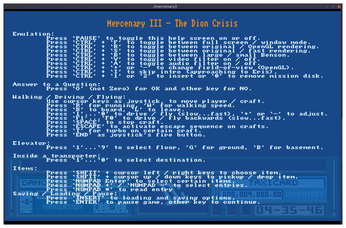FOSSPicks
1980s nostalgia in OpenGL
Mercenary Reloaded
The 1980s offered many great video games, but the memory of only a handful continue to have an impact into my adulthood. This handful includes Elite, some early Infocom text adventures, and a game called Mercenary. Mercenary was like the terrestrial version of Elite. As one of the original open world games, it starts when you crash your spaceship onto a planet drawn entirely from simple vectors. Between the green of the ground and the blue of the sky are buildings scattered across a vast city. With very few instructions, your first tentative steps have you walk towards a cuboid that could possibly be a vehicle to see whether pressing b will let you board it. It does, and from that point you're free to do whatever you choose as you walk, drive, and fly around the city trying to find a way to escape the planet's gravity. Your adventure takes you deep underground, high up to an orbiting station, past countless unique vector buildings, and under the Palyar Commander's Brother-In-Law. It's an utterly unique and immersive game, only improved by its filled-vector, 16-bit sequel, Damocles.
Sadly, the programmer behind Mercenary and Damocles, Paul Woakes, died in the summer of 2017, but Mercenary Reloaded by Jolly (Andreas Eversberg) is a worthy tribute. Not only does it cleverly reverse-engineer Paul's ingenious games engines, it hijacks their rendering processes and sends them to OpenGL, freeing all those glorious vectors from their 1980s/1990s 320x200-resolution constraints. The results are fabulous. Damocles' burning sun is no longer stepped. The tail of the comet is crisp. The shadows falling across your bus route is faultless. You even have the potential to run the game in VR, something never imagined in the 1980s. Thank you, Jolly, for this wonderful project. And thank you Paul Woakes.
Project Website
Buy this article as PDF
(incl. VAT)
Buy Linux Magazine
Subscribe to our Linux Newsletters
Find Linux and Open Source Jobs
Subscribe to our ADMIN Newsletters
Support Our Work
Linux Magazine content is made possible with support from readers like you. Please consider contributing when you’ve found an article to be beneficial.

News
-
Canonical Releases Ubuntu 24.04
After a brief pause because of the XZ vulnerability, Ubuntu 24.04 is now available for install.
-
Linux Servers Targeted by Akira Ransomware
A group of bad actors who have already extorted $42 million have their sights set on the Linux platform.
-
TUXEDO Computers Unveils Linux Laptop Featuring AMD Ryzen CPU
This latest release is the first laptop to include the new CPU from Ryzen and Linux preinstalled.
-
XZ Gets the All-Clear
The back door xz vulnerability has been officially reverted for Fedora 40 and versions 38 and 39 were never affected.
-
Canonical Collaborates with Qualcomm on New Venture
This new joint effort is geared toward bringing Ubuntu and Ubuntu Core to Qualcomm-powered devices.
-
Kodi 21.0 Open-Source Entertainment Hub Released
After a year of development, the award-winning Kodi cross-platform, media center software is now available with many new additions and improvements.
-
Linux Usage Increases in Two Key Areas
If market share is your thing, you'll be happy to know that Linux is on the rise in two areas that, if they keep climbing, could have serious meaning for Linux's future.
-
Vulnerability Discovered in xz Libraries
An urgent alert for Fedora 40 has been posted and users should pay attention.
-
Canonical Bumps LTS Support to 12 years
If you're worried that your Ubuntu LTS release won't be supported long enough to last, Canonical has a surprise for you in the form of 12 years of security coverage.
-
Fedora 40 Beta Released Soon
With the official release of Fedora 40 coming in April, it's almost time to download the beta and see what's new.


